#at least in the bbc adaptation
Text



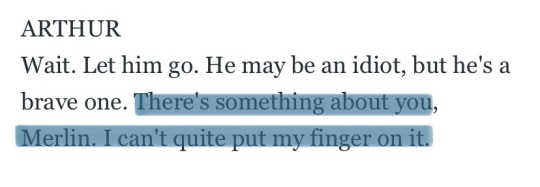






#something something about recognition#anyway this is really niche#nothing to look at just my current brainrots#one day cc will explain to me why they found each others familiar#soulmates ikr🤞🏻#‘maybe in another universe’.. but the other universe is WORSE#my contribution to the fandom is the bbc merlin crossover#using kitty as if they were my ocs#‘twp is inspired by arthuriana’ and i RAN w it#expect i used the LEAST accurate adaptation#kit herondale#ty blackthorn#the dark artifices#the wicked powers#twp#tda#shadowhunters#tsc#the shadowhunter chronicles#arthur pendragon#merlin
66 notes
·
View notes
Text
"But the reason why we retell the tales over and over is to create hope. We keep these themes and characters alive because we need them, because we need to make sense of what is happening and what needs to happen in our lives, and what better way to do that than with grand, tragic characters who already make sense to us? They explain the world to us and inspire us to keep going even though a happy ending may not be possible (Gilgamesh) and maybe because a happy ending may not be possible yet (Arthur).
“When Albion’s need is greatest,” Kilgharrah says in the last episode of Merlin, “Arthur will rise again.”
And he has risen when we needed him most. Multiple times. We were even the ones doing the resurrecting."
#besties what if I actually wrote my thesis about this#just. the way that folklore evolves over time to tell the story that society needs to hear#of course. the messaging of merlin is... problematic to say the least. but it is a reflection of 2010s queer assimilation politics#BUT THEN fandom comes in and says “fuck that. let these characters be gay and happy now”#and then we get arthurian adaptations like Gwen & Art#where lex croucher basically said “these characters have always been gay and I'm gonna give them a happy ending because I want to. fuck u."#and I think that's beautiful#arthurian legend#bbc merlin#gwen & art are not in love#epic of gilgamesh#< is there an epic of gilgamesh fandom? I hope so#narratives#tropes#themes#folklore
22 notes
·
View notes
Note
Hey! I saw your response to another ask regarding Les Mis adaptations, and I wanted to ask what is/are YOUR favorite adaptation/s and why?
Oooh, thank you for such an interesting ask!!
There’s still plenty of adaptations I need to watch, but my two favourites (I can’t pick just one!) out of the ones I’ve seen are definitely LM 1972 and 1925!
I won’t go into detail about why LM 1972 is such a great adaptation, since it’s already such a popular one for fans (I will say that I ADORE how Éponine is portrayed, and the rue Plumet scene is an absolute standout!)… but I think LM 1925 is an underrated hidden gem of an adaptation!
The whole thing is fairly long and it’s a silent picture, but don’t let that put you off, there’s so much that the film is able to explore thanks to its length! This adaptation even includes “Le Cabuc” (aka Claquesous) being executed by Enjolras at the barricades like we see in the novel, and while we don’t get Montparnasse and Éponine sneaking off “être Némorin”… we do get to see them going off to an inn together (Azelma even comes too!) while the rest of the Patron-Minette are imprisoned… and we get this hilarious little cheek kiss between them (after Montparnasse asks Éponine to scout out rue Plumet and she agrees begrudgingly, which is why he kisses her)


I also like LM 1925 because it includes so many unnamed rogues who seem to be associated with Patron-Minette! Even if we don’t get their names and they mostly just stand about in the background, I always appreciate adaptations of LM that show the Patron-Minette consisted of more individuals than just Gueulemer, Babet, Claquesous and Montparnasse (in the majority of adaptations it’s a miracle if you even get all four of the Patron-Minette leaders on screen!). The Gorbeau ambush scene is absolutely GOLD in this adaptation, because there’s no dialogue in the film (dialogue cards appear but are limited in their appearances) there’s so much more room to simply absorb the spectacle of the scene, and there’s these wonderful haunting shadows dancing on the walls— I’ve recently posted a clip on my blog if you’re interested!
Aside from the specific Patron-Minette appearances that I’ve rambled on about, LM 1925 is just great in general! I really can’t recommend it enough!
#THANK YOU FOR THE ASK FRIEND!#if you’re curious to know my least favourite adaptation— its LM 1935#I do have some slightly unpopular opinions on some other adaptations though…#namely… I don’t think that the 2018/2019 BBC miniseries is always as bad as people make it out to be#let me clarify— I’m not saying the adaptation is good. I’m just not saying it’s always completely terrible#but I shall hide that opinion in the tags because I am afraid#ask response#adaptations
14 notes
·
View notes
Text
Me when I see any version of Sherlock Holmes: aww, the skrunkly
Me when I see Benedict Cumberbatch Sherlock: kys
#you might think this is an anti BBC sherlock post until you go to my blog#BBC sherlock is my favorite and least favorite adaptation by far in both directions#BBC sherlock#Sherlock Holmes
12 notes
·
View notes
Text
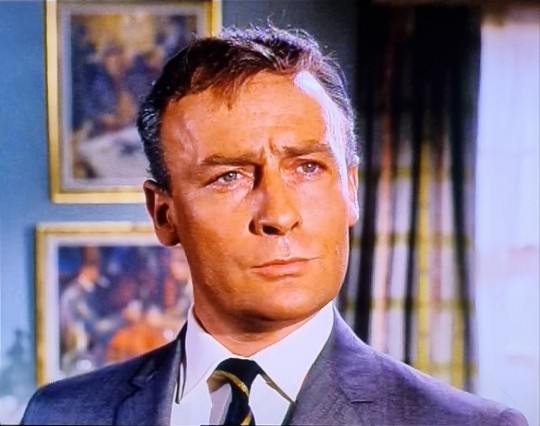



Edward Woodward guest stars as Jack Liskard, Prime Minister of an unspecified African country and the target of multiple assassination attempts, in The Saint: The Persistent Patriots (5.15, ITC, 1967)
#fave spotting#edward woodward#callan#the saint#the persistent patriots#1967#david callan#classic tv#eddy is the named guest star for this episode but actually he wasn't really the household name he would become at this point#in fact this ep was the first Saint episode to air in the uk in 1967 on January 6th‚ setting off a banner year for Woodward that would#be the making of his career. he'd done a few guest spots (Sergeant Cork and Mogul among them) and yes he'd had some stage success#but 67 was his year; around the same time as this Saint appearance he could be seen on the BBC's celebrated drama strand Theatre 625 as the#lead in a multi episode adaptation of Evelyn Waugh's Sword of Honour‚ and almost exactly a month later he'd be making his first screen#appearance as Callan in the Armchair Theatre pilot A Magnum for Schneider‚ the beginning of tv immortality and bigger and better things for#the actor. here he's... well he's serious and he's sullen (two of Ed's strengths as an actor) in a role which.. is FINE on the surface but#absolutely begs some deeper questions. he's the prime minister of an unnamed African country‚ in London to negotiate the independence of#said country from the UK. it's.. a complicated issue (which this single Saint episode absolutely fails to address but I'd have been truly#astonished if it had). i mean yes we're all anti colonialism here of course (even if Simon does seem suspiciously morose about the prospect#of losing another colony in his opening voice over‚ he at least appears to be on Eddy's side through the episode) but there's a kind of#deafening silence throughout this ep: Ed is of course white. his various ministers and other government officials who oppose him are all#also white. the titular 'patriots' who oppose him and make attempts on his life and to prevent the process of independence are all white#the most obvious comparison to be drawn (and presumably the main inspiration for the character) is Rhodesian prime minister Ian Smith#who had led the white minority government of what is now Zimbabwe from 1964 and had been involved in similar negotiations with the british#government (that fell apart in late 65 as Smith's government announced Rhodesia's unilateral independence; the country then became an#unrecognised state subject to economic sanctions that lasted more than a decade). the thing is‚ Smith was a racist piece of shit; the whole#reason those negotiations broke down was because of his refusal to secure black representation in Rhodesia's governance#which makes the complete absence of any black characters in this episode a major red flag. but Ed's character isn't presented as the#villain of the piece; the episode is adamant that the work he's doing is selfless and for the betterment of his country‚ and it isn't as if#Smith was a particularly popular figure in the uk at this point for the ep makers to be painting a positive portrait of him. idk#it's messy. at best tone deaf and at worst.. well. i wish Ed had had a better ep to guest star in that's all im saying
8 notes
·
View notes
Text
I love Shakespeare, but I feel like that’s either extremely obvious because it’s Shakespeare it extremely pretentious because it’s Shakespeare.
#I am currently obsessing over Hamlet#Romeo and Juliet being on the English curriculum is a blessing#Othello is also really good I am a big fan of Othello#I also love seeing different Shakespeare adaptations#I saw this brilliant production of Hamlet on BBC and now I cannot find it#I do not love seeing different Shakespeare adaptations if said adaptations contain Laurence Olivier#I absolutely hate Laurence Olivier#My absolute least favourite actor is Laurence Olivier#This has turned into a rant about Laurence Olivier#I’m sorry but the man can’t act#Not that I could do any better but my point stands
4 notes
·
View notes
Text
I genuinely wish that my college english litterature professor were on Tumblr for Dracula daily.
Because oh boy the whole website is making the point way better than I did when I was in her class that VAMPIRISM ISNT SEX LIBERATION and Lucy and Mina are not aroused by Dracula and that it isn’t about sexual liberation VS victorian puritanism and close-mindedness but good vs evil.
#dracula#dracula daily#although to be completely fair she also tried to explain to us why Jane Austen#was a horrible misogynist and also only showed us#for the whole year#movie adaptations of books we studied IF those adaptations had at least one sex/nude scene and a bit of gore#so no pride and prejudice BBC or 2005#but pride and prejudice and zombies#dracula we saw bits of the coppola one and the most wanton and or gory parts of what was it#the vampire diaries i think but i'm not sure
15 notes
·
View notes
Text
fucking FINALLY got to the point in the timeless video where i can fit in jane and bingley oh my god that took forever. yes in theory i could have picked a spot for them earlier but i didn’t know what lyric i wanted them all over and they couldn’t be too close to all the laurie and amy’s or too close to all the cinderellas or too close to. well all the redacteds. that shouldn’t be redacted because it’s not technically embarrassing but the way in which i went about it sort of is. well basically you know how my buddy kit is just like. well you know. and you know how after allie there’s my buddy. well you know. anyway whatever the point is that i’m almost done
#now. why are they jane and bingley? you ask. and the answer is just that like. well dru is lizzie. so.#look i didn’t think too hard about everything i put in here#i wanted to have a few characters in here that had multiple iterations so i went for pride and prejudice#because i’ve seen and loved at least 3 pride and prejudice adaptations not the bbc one sorry auguste i just haven’t seen it#did not include the lizzie bennett diaries though because that would have been ridiculous sorry#even though frankly jane and bingley were lame in the zombie movie but like they were there so#the goal is to finish this in the next few days so you’ll have to deal with me reblogging it every day all next week#beth.txt
3 notes
·
View notes
Text
The only reason I ever watched Supernatural or BBC’s Sherlock was because I was a Doctor Who kid and the SuperWhoLock years made me feel like I had no choice but to watch the other two just to understand what was happening.
#crow rambles#confession#doctor who#supernatural#bbc sherlock#superwholock#I enjoyed supernatural (to a point) far more than BBC Sherlock#mostly because BBC Sherlock is truthfully my least favorite modern adaption of Sherlock Holmes
4 notes
·
View notes
Text
he's asexual btw. mayhaps even aroace. to me at least
3 notes
·
View notes
Text
brian protheroe is really handsome
#well at least he was in 1983#this is one of my major takeaways from jane howells wars of the roses adaptation for the bbc television shakespeare#i AM gonna have to watch her richard iii....... as well as laurence olivier's#i mean they seem to be two completely different projects. obviously. one's a big budget 1950s hollywood feature film#looks prestige and glamorous as hell#and the other is a full-of-heart but comparatively low-budget made-for-tv movie#as well as the fourth installment of a whole series of plays whereas olivier's was made to stand on its own#but also in jane howell's favors is the actors on her rotating cast that i find handsome. so.#i have always said this but: it is always valid to watch a movie bc A Man In It Is Handsome#i will hear no argument to the contrary#tales from diana#text post#also he apparently made music in the seventies and it's some of the most seventies shit ive ever heard#he was 39 playing kind edward! he looked. not necessarily *much* younger than that but when you compare him to#peter benson who was only a year older.... that was a steep year lol#sorry peter love you xoxox
1 note
·
View note
Text
I am so happy with the conclusion of BBC Ghosts.
There were so many things I loved about the final series that I can't even keep it all straight in my brain, I'll have to rewatch it all (and the Christmas special, of course! Must remember it's the not the true end yet!)
But something I can immediately say I loved was what they didn't do. See, that line in the trailer that turned out to be from episode 5 - about there being a pattern to when they move on - worried me. One of the best things about the show, to me, is how there truly is not any reason at all to why the ghosts are there, or when they go. It's something the creators have said over and over, and that the show has always backed up; we saw so many times that, unlike in most ghost media, addressing unfinished business or achieving emotional resolution changes absolutely nothing. Pat hit some sort of emotional resolution three times. And Julian realised the importance of family, and Robin saved someone’s life, and Thomas discovered the truth of his death, and so on and so on. Finding closure isn't the end, and equally, the end isn't predicated by a climatic conclusion. It just happens. And the same is true for why people become ghosts. It just happens. And you exist, and fill your days, and then you’re gone. And no one knows why.
It's kind of the most agnostic television show I've ever seen.
I love that. Every other afterlife show I've ever seen has some kind of reward and punishment system. Or at least says that there's a reason for things, some kind of higher power at play, not necessarily a god but something like it. Even the American adaptation felt the need to bring Hell into it, which is why I need to specify that I'm only talking about the British version here. And I feel like a lot of fans wanted there to be reasons too, or felt like there simply had to be, that it wasn't even a question. I get why - it's not just because it's the standard for ghost narratives. It's really uncomfortable to think about the randomness of life and death. But Mary didn't go because of anything that happened before that day, and Cap was never going to go because he came out, and one day, when they've all gone, there won't have been a reason for it.
Because the real point of BBC Ghosts is that there is no point. You’ve just got to make it through the days, surrounded by people that irritate you, trapped in a confusing world where you’re mostly powerless. And it sucks, and you're angry, and sad, and bored as hell. And you also find happiness in the mundane chaos, and you get really good at chess, and watch the ants in the garden, and write bad poetry, and read terrible romance novels, and gamble money you don't have, and go camping, and play games, and learn French, and watch reality TV, and have sex with a decapitated Tudor nobleman’s body, and dance to old music, and look at the stars, and find that you actually really love all those annoying people after all, and that’s the point.
#bbc ghosts#bbc ghosts spoilers#bbc ghosts series 5#but imagine if they prove me wrong by melodramatically killing them all off at christmas though lmao actually that would be hilarious do it#also love so very much that they finished on a gay joke they know who's on the front lines for them <3#god it's a cliche but really do already miss 'em
726 notes
·
View notes
Text
UK government planning to scrap a major disability benefit
I'm only just scraping by and the government are proposing to take away PIP (a disability benefit), which would be HALF of my income wiped out.
"Reforms to personal independence payments (PIP) could include stopping regular cash payments, and instead offering claimants one-off grants for things like home adaptations."
-- "Disabled people face end to monthly benefits cash", BBC News, 29 April 2024
And:
"The plans, which will be consulted on over the coming months, also include proposals to “move away from a fixed cash benefit system”, meaning people with some conditions will no longer receive regular payments, but instead access to treatment if their condition does not involve extra costs."
-- "People with depression or anxiety could lose sickness benefits, says UK minister", Guardian, 29 April 2024
That's what the NHS is supposed to be doing...
Genuinely absolutely terrifying.
Can anyone living in the UK join in with an (hopefully!) overwhelming cascade of unique emails to their MP opposing this? WriteToThem.com makes it very quick and easy.
They're proposing to replace it with one-off grants that the individual can apply for, which is absurd and horrifying, so feel free to point out how that won't work as well!
Here's what I'm writing, and do not just copy-paste my letter/email, because that makes it less legit. Do your own thing, even just one sentence telling your MP that you're opposed is enough if that's all you can manage. Whatever you want to say is what your MP needs to hear.
Dear [MP's name],
Today I learned that the government plan to scrap PIP, and maybe replace it with something like a one-off grant application process, before the next election. ("Disabled people face end to monthly benefits cash", BBC News, 29 April 2024: https://www.bbc.co.uk/news/articles/cn0ry09d50wo)
PIP is about half of my income (about 44%). I don't spend it on occasional large purchases, I spend it on countless things that are more expensive for me than they are for other people. PIP is in place to acknowledge, as it says in the above article, that disabled people's lives are more expensive than non-disabled people's lives by hundreds of pounds per week. ("Previous research from Scope suggests households with at least one disabled adult or child face an estimated average extra cost of £975 a month to have the same standard of living as non-disabled households." That's £225 per week, and the maximum amount of PIP you can get is £184.)
So firstly, it could be argued that PIP doesn't even cover the additional expenses of the average disabled household.
And next, the cost of implementing an alternative system would be worse for disabled people, totally unsuited to its purpose, and more expensive to run.
Worse for disabled people: Currently PIP acknowledges that being disabled takes a lot more work to maintain a comparable standard of living, and as it's an amount of work that the claimant cannot sustainably do, they are given money so that they can pay someone else to do it. These costs are distributed across all living expenses, in addition to occasional one-off purchases of e.g. mobility aids. Having to apply for one-off payments for expenses would be more work on top of that, so if the disabled person isn't able to do it (which is very likely) they will either have to work less in their day jobs in order to spend more time applying for one-off grants, or they will have to also apply for one-off payments to pay someone to apply for more one-off payments. This is self-evidently a waste of energy and time, and totally impractical, as well as being counter to the entire point of disability benefits. It would also be extremely undignified for the disabled people, and arguably against human rights (right to private life and dignity), to have to justify each purchase to the government.
Totally unsuited to its purpose: One off-grants are not suited to ongoing higher expenses such as having to buy more prepared food (e.g. carrot batons are more expensive than raw carrots and go off much more quickly). Does this policy assume that disabled people's PIP is only for things like wheelchairs and walking sticks?
More expensive to run: The system for PIP applications is already fairly backlogged, in that my last application took over 6 months to complete. I was awarded PIP for 10 years. If every application for a one-off grant had to be accompanied by an application of a similar scale that wouldn't be workable, so presumably an initial PIP application like the current system's would still be required to qualify for the system in the first place, and then following that, numerous smaller applications for money (e.g. for taxis, pre-chopped veg, painkillers, specialist clothing, etc.) would be carried out per person per month. The disability benefits system would have to be scaled up significantly, and it would be much more expensive. It is far cheaper to give people a set amount of money based on their needs; it's the same money that you would be giving them in grants anyway, but without having to process each purchase/one-off application.
I implore you to oppose this proposal. It is blatantly unworkable to the level of absurdity, but more importantly it is inhumane.
I look forward to your reply detailing your stance. Many thanks in advance.
Yours sincerely,
[My name]
But, again, if you can't manage anything long or complicated like that, your best is good enough. Even if they're not all perfectly written and detailed, we want to bowl them over with sheer quantity of emails.
#disability#disabled#armchair activism#UK#UK politics#PIP#personal independence payments#DWP#department for work and pensions#disability benefits#activism
161 notes
·
View notes
Photo
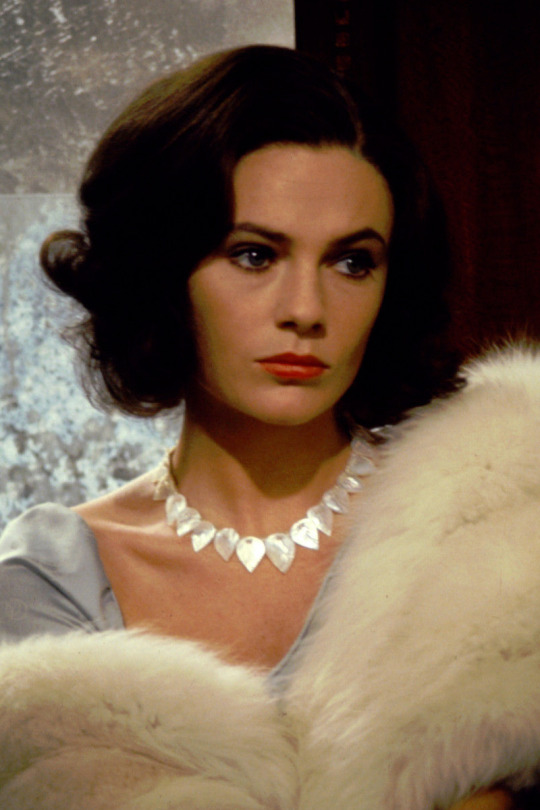
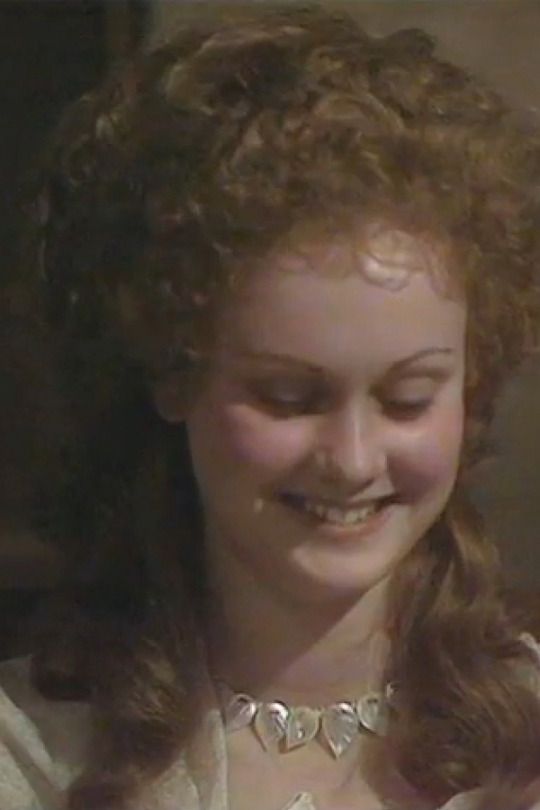
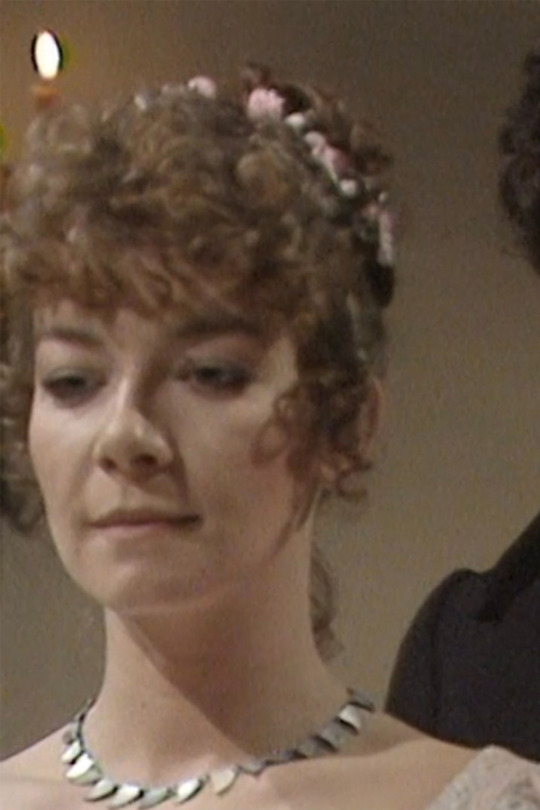
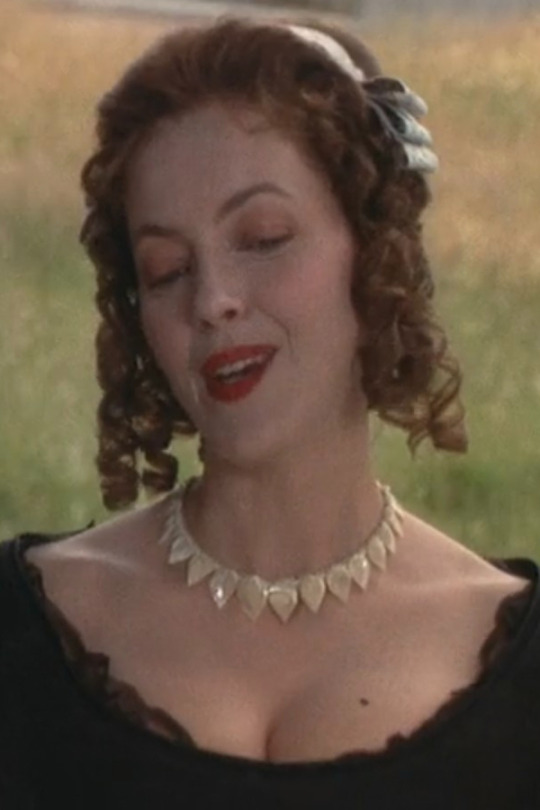

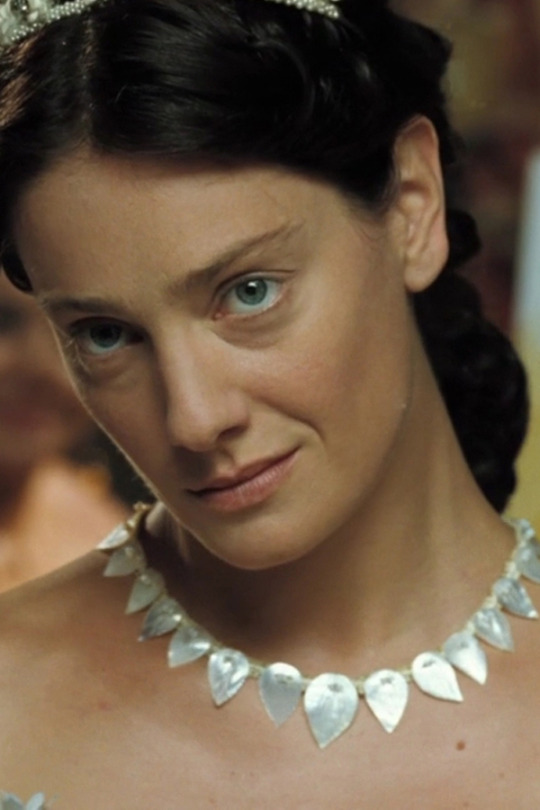


This necklace has been used at least eight times over the years. It was first seen in the 1974 adaptation of Murder on the Orient Express, where Jaqueline Bisset wore it as Countess Andrenyi. In 1979 it appeared on Sarah Jane Curran as Princess Augusta Sophia in The Prince Regent as well as on Clare Higgins as Kitty Bennet in Pride and Prejudice. It was not used again until 1997 when it appeared on Greta Scacchi as Juliana in The Serpent’s Kiss. In 2005 it was seen on the BBC production Beethoven, worn by Holly Radford as Eleonore Wegeler, and in 2007 it appeared in Love in the Time of Cholera adorning the neck of Giovanna Mezzogiorno as Fermina. In 2009 it was recycled by Laura Pyper as Jane Fairfax in Emma, and finally in 2022 it was spotted being worn by Gwendoline Christie as Principal Larissa Weems in Wednesday.
Costume Credit: carsNcors, Shrewsbury Lasses, Aurora
Contact Us: [email protected]
Follow: Website | Twitter | Facebook | Pinterest | Instagram
#wednesday#gwendoline christie#emma#laura pyper#love in the time of cholera#giovanna mezzogiorno#beethoven#holly radford#greta scacchi#the serpents kiss#clare higgins#pride and prejudice#sarah jane curran#the prince regen#jaqueline bisset#murder on the orient express
807 notes
·
View notes
Text
since it's almost barricades days and i've seen new people joining our fandom, i would like to list u all some very nice adaptations i really like that u can watch (and that are better alternatives than the bbc adaptation) (and i included links!!!!!):
what to watch ?
- i feel like this is a classic, but the 2012 movie adaptation by tom hopper, obviously. while it's not the best adaptation, it is still really good (also i feel like it made a lot of us join the fandom in the first place)
- also pretty obvious but the west end musical by claude-michel schönberg and alain boublil (i'm pretty sure u can find decent bootleg on yt) + honorable mention for the 25th anniversary concert but i feel like u need to know a bit about the musical before seeing the concert
- a personal favourite, the 1982 french movie by robert hossein, it is three hours long tho, but it's worth it; the adaptation is really good, especially the portrayal of Les Amis (here's the yt link to the whole movie)
youtube
- shojo Cosette is also pretty decent, tho i've only watched the episodes with Les Amis (the barricades are heartbreaking just like we love)
- it's really obscure but the silent short film l'enfant sur la barricade (the child on the barricade) by Alice Guy. the sources diverge from whether it's an adaptation of les mis or an adaptation of a poem hugo wrote called "sur une barricade" and taking place during the commune of paris but the character could be inspired by gavroche
youtube
- Les Amis webserie, that u can find on yt, or here :
it's a web serie made by fans for fans and it's amazing
- All That's Left Of Us, another web serie made by and for fans. it's beautiful and absolutely heartbreaking. u can find it on youtube or here:
youtube
and on the overall anything that eli southern does about les mis is pretty amazing so i encourage u all to go check @thecandlesticksfromlesmis
(although i feel like u need to know a bit about the fandom before jumping right into the webseries)
- and obviously, The Brick, the original masterpiece that is Les Miserables by victor hugo; if u have the courage i promise that it's worth it
annnnd that's all ! at least for my favourite one, but there are a looooot of different adaptations for every taste i guess ! anyway have fun and take care of y'all during barricades days !
#here you go !#i promise u it's worth it#les mis#les miserables#les amis de l'abc#the brick#victor hugo#bbc les mis#shojo cosette#all that's left of us#les mis 2012#les mis musical#sorry i couldn't find more links to every thing#but i tried including the more “obscure” one#i'm slowly turning this blog into a les mis guide 101
259 notes
·
View notes
Text
The best Sherlock Holmes adaptation (that people hardly know)
The stories and adventures of Sherlock Holmes is probably one of the most well-known, most referenced, and most recognizable series out there, as well as one with an insane number of adaptations. Hell, Sherlock Holmes even holds the world record of being the literary character with the most screen adaptations.
This has led to many, many people making ranked lists of their favorite adaptations, and I've looked at a lot of them to see if my favorite one appears. It doesn't. Not here, here, here, here, here, here, or here.
On the Wikipedia page for Sherlock Holmes adaptations, it is listed...in the external links section, at the very bottom of the webpage; it's only visible by expanding the "screen adaptations of Sherlock Holmes" panel
On here, under the three names it's regularly tagged as, there are a collective 13.9k followers (the breakdown is 5.2-1.9-6.8). In comparison, the "bbc sherlock" tag has 47k followers, "sherlock" has 644k, and "john watson" has 13k followers. Pretty underrated, if you ask me.
And so, you're probably wondering what this adaptation is, and why I think it's the best. Wonder no further!
The best Sherlock Holmes adaptation (at least, to me) that is criminally underrated is called Yuukoku no Moriarty, or Moriarty the Patriot. (and before you ask, yes, it's a manga! with its own anime!)
Now, because this post is already long enough, and because there is going to be A LOT OF BIG SPOILER WARNINGS, I'll be defending my claim under the read-more. But with that out of the way, let me begin...
Reason #1: Wait, Moriarty??
Moriarty is well-known to be the arch nemesis of Sherlock Holmes. He's the big baddie of the original series. So why in the world is this adaptation named after the villain?
Because the plot is focused around Moriarty. As far as I am aware, this could be the ONLY adaptation so far that has done this (please correct me if I'm wrong! I'd love to find more). Furthermore, the "James Moriarty" in question is actually three brothers: Albert, Louis, and William (the "main" Moriarty), and the overarching plot follows their schemes as "the Lord of Crime" to... change 19th century England for the better?

Reason #2: The Premise is INTERESTING as FUCK
Yeah, you heard me! The big baddie in this adaptation is trying to do what they deem as "good"! It's called Moriarty the Patriot because William, Louis, and Albert are trying to make England a better country in their own ways; they view the class system of 19th century England to be, quite frankly, shit, and want to lessen the abuse and dehumanization of the lower class caused by the nobles.
And, well, they do this by killing corrupt nobles. Or, well, more accurately, they help people commit crimes to kill the nobles, and stage it to look like an accident or make it extremely difficult to solve. It's actually really fun and cathartic to watch imo, especially in the early episodes of the anime and the early chapters of the manga. I'll come back to the plot later, but for now, I think it's time to get back to the characters.
Reason #3: The Gang's all Here!
The three Jame Moriarty brothers aren't the only characters: you also have the baker street gang (Sherlock Holmes, John Watson, and Ms Hudson), the Baker Street Irregulars, Mycroft, Sebastian Moran from the original series, Lestrade, Irene Adler, Herder (another character from the original series), and interestingly enough, Billy the Kid (in the manga). And these characters aren't just one-dimensional name-drops, but characters with so much personality, backstory, and motives. Take, for example, Sebastian Moran: he's a sniper who works for the Lord of Crime, yeah, but it's because he has a long-earned loyalty to William; both of them have a keepsake from the other, and after William's supposed death during this adaptation's version of "The Final Problem", it's the keepsake he gave to William that saves him from a dark path (there's much more to this story in particular, but you'll have to find out more yourself if you're interested).
Also, there's Moneypenny in the manga. But why the hell is she here?
Reason #4: His name is James. James Bond (and he's trans!)
NAME ONE OTHER FUCKING SHERLOCK HOLMES ADAPTATION THAT HAS JAMES BOND, I'LL WAIT. YOU CANNOT.
But yes, James fucking Bond is in Moriarty the Patriot, and is one of the best characters for many reasons. One of them? We actually meet him as a woman. And who is that woman, you might ask?
Irene Adler.

(note: the version I read calls him James Bond, but from what I've heard, his name is actually spelled "James Bonde" to avoid copywrite issues. However, for this post, I'll use "Bond")
It's...incredible. The entire arc introducing Irene Adler and her arc into becoming James Bond is one of my favorite arcs in Moriarty the Patriot. It takes the original "A Scandal in Bohemia" and sprints with it.
Like, the entire Bohemian-king-wanting-that-photograph with Sherlock and Watson is just a ploy, so Irene can be under the protection of public-hero Sherlock by tricking him into thinking he blew up her house with his smoke-bomb trick. Because she stole ENGLISH GOVERNMENT DOCUMENTS SO CLASSIFIED, THE GOVERNMENT WANTS HER DEAD.
It's just the way the series builds off the original works by Doyle in a way that not only stays true to the original, but is also its own thing. Because yeah, we don't see Irene Adler again after her "scandal" is solved; and that's because she fakes her death as Irene, and starts working under the Moriarty brothers as James Bond, now a man.
Additionally, Moriarty the Patriot handles Bond being trans in an amazing way. Him being trans is no joke! The Moriarty group accept him as a man the moment he tells them (except for Sebastian Moran, who's confused about it at first before he warms up to it; in all actuality, it's his confusion and reluctance that's joked about, not Bond's manhood, which is a refreshing thing to see as a queer person myself). Even when reuniting with Sherlock, John Watson, and Ms Hudson, the three are respectful and understanding.
Oh my god wait a minute I just realized I haven't even mentioned Sherlock yet-
Reason #5: Benedict Cumberbatch WHO
Sherlock Holmes in this adaptation is the best Sherlock, hands down. Why? Because he's fun, goddammit!
So many Sherlock adaptations see the genius personality of Sherlock Holmes and see nothing else. They make him cold, uncaring, calculative. A lot of Sherlocks would shoot a man dead for a lead on a case.
But not this Sherlock. Is this the face of a man who's cold and uncaring?
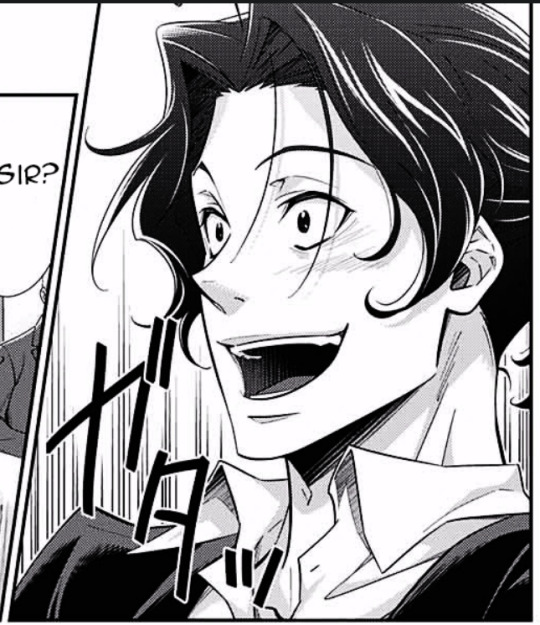
HELL FUCKING NO! And he's literally presented with the opportunity to shoot a man for a lead on a case, and he turns it down! Because he's good!
Yeah, he's prideful. Yeah, he can be a prick. He treats Scotland Yard like a joke. But he's also silly. He's kind to the people he cares about. He wants to help people. He's hilarious with Ms Hudson and Mycroft, and his interactions with William Moriarty is one of the best things to read about in this adaptation, because their cat-and-mouse game matters so, so much in this story.
Reason #6: Cat and mouse; puppet and puppeteer; friend and...friend?
Sherlock has a very interesting role in Moriarty the Patriot as a whole. Sure, he's the detective. But he's so much more.
When he's introduced (in episode 6 of the anime, mind you!) to the story, the overarching plan of William and his brothers shift to include him: William wants him to be the hero of the play they're setting for the country, because in the end, William plans to be defeated as a common enemy of the people.
And so, the game begins. The Lord of Crime starts setting up crimes for Sherlock to solve, so he gains publicity. So he's recognized as the hero. He's the only man smart enough to solve the trail of breadcrumbs Moriarty leaves, after all.
Sherlock starts as just a puppet in the plan of things. Led along on strings from crime-to-crime, slowly piecing things together.
And Sherlock hates it.
But...Sherlock and William meet outside of being a simple detective and criminal. They meet on a ship, and for the first time, William finds his mind not drafting up plans or thinking as the Lord of Crime the first time they speak to each other. And for the first time, Sherlock finds someone with a mind equal to his own. They meet again, on a train, and solve a murder together (one William was NOT behind). And behind this game of cat-and-mouse, behind the puppet and puppeteer, something blooms.
When Sherlock learns that yes, the William James Moriarty he's grown to known is indeed the Lord of Crime, he's not mad. He's...glad.
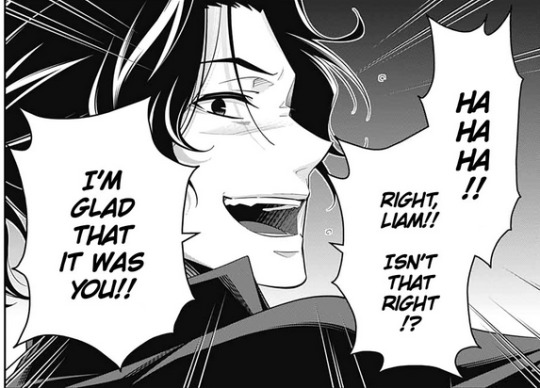
(note: Sherlock calls William Moriarty "Liam", beginning with their meet on the train; he's the only character in the series who does this. Not even the other Moriarty brothers call their brother "Liam")
He's glad it was William; it couldn't have been anyone else, in his opinion. It wouldn't have been worth it otherwise.
It all comes to head in this series' version of "The Final Problem", where Sherlock finally confronts Moriarty, once and for all. It's where William plans to be defeated by his nemesis, the hero. Because he's the self-proclaimed villain.
"Catch me if you can, Mr Holmes", is what he challenged to Sherlock on the train, after he joked about William being the Lord of Crime.
And Sherlock catches him, in the end. But not as a detective. He catches him, as a companion, after William jumps to his death into the river Thames to set his defeat to Sherlock in stone.

Reason #7: What Comes After
The anime ends after "The Final Problem", but the manga continues. And this is where I really, really think this adaptation shines its brightest, with the aftermath of everything the series has been building to.
The main reason Moriarty chooses his death is because of the bad things he's done his entire life. He never enjoyed killing people, but felt he had to, and felt his death was the proper "punishment" for it. But through Sherlock, he finds that that isn't the answer.
It's obvious that Sherlock would live through the fall into the Thames. But what about William? In most adaptations, he dies. In the original, he died.
But in this? They both live. They both survive.
Some big ideas floating around before "The Final Problem" involved revenge. An eye for an eye, if you will. Judgement, and delivering it.
But afterwards? It's atonement. It's forgiveness, and the lack of it. It's growth, and redemption.
They're saved and taken to America to recover and start new lives. William Moriarty finds ways to atone for his actions without choosing death. Sherlock does too, for his own crimes. They decide, together, to begin anew, find new purposes.

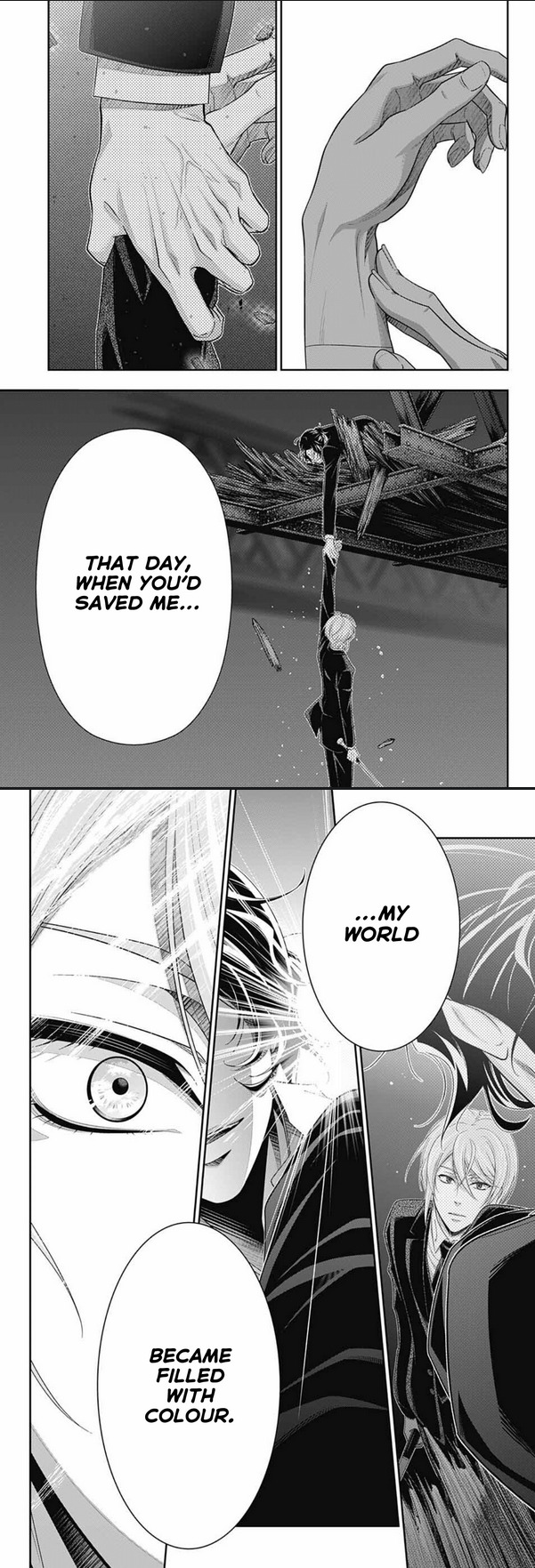
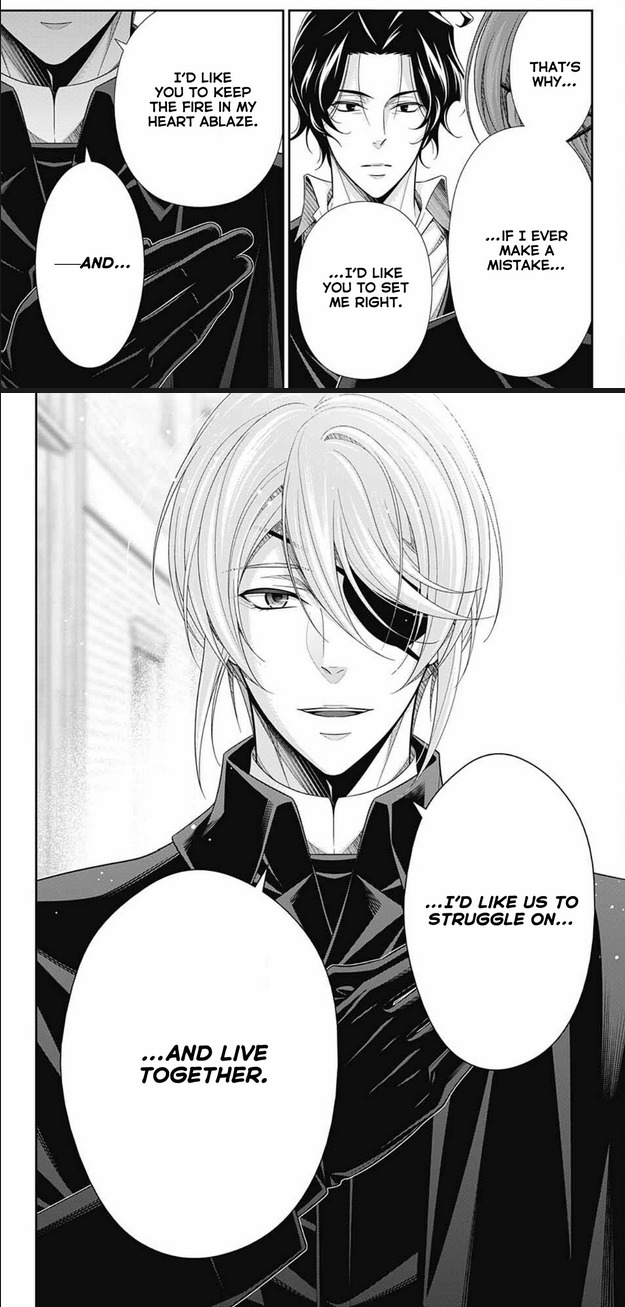

and it's beautiful.
When they return to England, three years after their disappearances, their growth is obvious and amazing to see; the other members of the Moriarty gang have also chosen their own paths of redemption, and seeing it all come together is something I'll always enjoy rereading over and over. And the redemption and reunion with England is just the end of part 1 of the story. There's more to be made with this series.
Reason #8: Made With Love
It's so, so obvious that Moriarty the Patriot was made with love for the original series. The way details of the original stories are kept and built off of to work flawlessly as it's own story is something I will be continously impressed by. There was so much thought, heart, and soul put into this adaptation, and you can tell it by reading and watching it. There are so, so much more I could go into—like the music in the anime, deeper dives into the arcs of the main cast, how well the relationships between characters are formed and established—but I think it'd be better for you to just find out all of these things by yourself.
So please, if you've gotten this far, give Moriarty the Patriot a try. Let it prove to you how good it is. Let it show you that it really is the best Sherlock Holmes adaptation out there.
130 notes
·
View notes